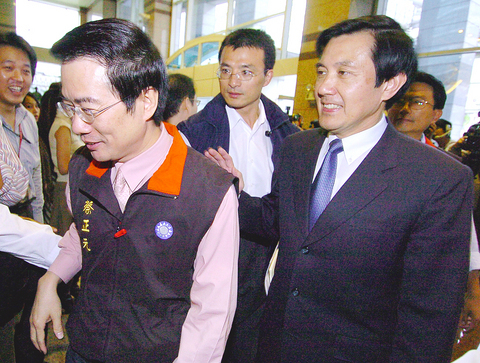A group of Chinese Nationalist Party (KMT) lawmakers yesterday suggested amending the party's anti-corruption regulations that would prevent Taipei Mayor Ma Ying-jeou (
"I will propose a special clause to exclude the `black gold clause' regulation's influence on Ma, should the worst case scenario occur and he is indicted," KMT Legislator Alex Tsai (
The KMT's "black gold exclusion clause," which was amended under Ma's chairmanship in the hope of improving the party's image and integrity, states that any member may be suspended if they are indicted.

PHOTO: LIAO CHEN-HUEI, TAIPEI TIMES
Tsai said yesterday that the investigation into Ma's handling of his allowance was "wrong," as the problems had arisen out of a "flawed system" rather than "corruption."
"There has been a strong reaction [to the accusations against Ma], with many people saying they couldn't bear seeing Ma being treated so unjustly," Tsai said.
Tsai said he didn't discuss the idea with Ma in advance.
"Even though Ma is against this, I still insist that a special clause should be enacted," he said.
Legislative Speaker Wang Jin-pyng (
"If we want to do this, should the special clause be ex post-facto? For example, would it apply to Cheng Yung-chin (
Cheng, the Hsinchu County commissioner, was indicted by Hsinchu District Prosecutor's Office on Aug. 9 on suspicion of accepting bribes from construction companies. He was then suspended by the KMT.
Ma and the party's highest decision-making committee yesterday disapproved of Tsai's idea, agreeing that the move would place Ma in an difficult position.
"Chairman Ma was totally against changing the party's regulations for his benefit alone," KMT Spokesman Huang Yu-cheng (黃玉振) said after the party's weekly Central Standing Committee yesterday.
Huang said that all of the committee's members opposed Tsai's proposal to amend the regulations, while stating their belief in Ma's innocence.
Although Ma was said to have disagreed with the proposal, he did not strongly oppose the idea earlier in the morning, saying that he would allow the party to decide whether or not the regulations should be changed.
"These are our party's regulations. It should be left for the party to decide [whether or not to amend the regulations]," Ma told the reporters while attending a municipal event.
Asked to comment on objections to the proposal expressed by several party legislators, Ma said all kinds of opinions would be included in the party's discussion.
During yesterday's meeting, Ma continued to stress his innocence to party members and urged the KMT to unite in what is a difficult time.
"It would be unjust if my handling of the mayoral special allowance fund was viewed as corruption. It would also be an insult to the 6,500 local chiefs around the country," Ma said at the meeting.
Arguing that amending the clause was "redundant," KMT Legislator Shuai Hua-ming (
"Does the KMT have another presidential candidate? Is there a presidential candidate with more integrity than Chairman Ma in Taiwan?" he asked at the KMT headquarters.
Democratic Progressive Party (DPP) Legislator Wang Shih-cheng (
DPP Legislator Hsu Kuo-yung (徐國勇) said that if the KMT wanted to modify its regulations for Ma, it meant that they knew there was something wrong with his handling of his special allowance and that he may be indicted as a result.
Additional reporting by Flora Wang

SECURITY: As China is ‘reshaping’ Hong Kong’s population, Taiwan must raise the eligibility threshold for applications from Hong Kongers, Chiu Chui-cheng said When Hong Kong and Macau citizens apply for residency in Taiwan, it would be under a new category that includes a “national security observation period,” Mainland Affairs Council (MAC) Minister Chiu Chui-cheng (邱垂正) said yesterday. President William Lai (賴清德) on March 13 announced 17 strategies to counter China’s aggression toward Taiwan, including incorporating national security considerations into the review process for residency applications from Hong Kong and Macau citizens. The situation in Hong Kong is constantly changing, Chiu said to media yesterday on the sidelines of the Taipei Technology Run hosted by the Taipei Neihu Technology Park Development Association. With

CARROT AND STICK: While unrelenting in its military threats, China attracted nearly 40,000 Taiwanese to over 400 business events last year Nearly 40,000 Taiwanese last year joined industry events in China, such as conferences and trade fairs, supported by the Chinese government, a study showed yesterday, as Beijing ramps up a charm offensive toward Taipei alongside military pressure. China has long taken a carrot-and-stick approach to Taiwan, threatening it with the prospect of military action while reaching out to those it believes are amenable to Beijing’s point of view. Taiwanese security officials are wary of what they see as Beijing’s influence campaigns to sway public opinion after Taipei and Beijing gradually resumed travel links halted by the COVID-19 pandemic, but the scale of

A US Marine Corps regiment equipped with Naval Strike Missiles (NSM) is set to participate in the upcoming Balikatan 25 exercise in the Luzon Strait, marking the system’s first-ever deployment in the Philippines. US and Philippine officials have separately confirmed that the Navy Marine Expeditionary Ship Interdiction System (NMESIS) — the mobile launch platform for the Naval Strike Missile — would take part in the joint exercise. The missiles are being deployed to “a strategic first island chain chokepoint” in the waters between Taiwan proper and the Philippines, US-based Naval News reported. “The Luzon Strait and Bashi Channel represent a critical access

Pope Francis is be laid to rest on Saturday after lying in state for three days in St Peter’s Basilica, where the faithful are expected to flock to pay their respects to history’s first Latin American pontiff. The cardinals met yesterday in the Vatican’s synod hall to chart the next steps before a conclave begins to choose Francis’ successor, as condolences poured in from around the world. According to current norms, the conclave must begin between May 5 and 10. The cardinals set the funeral for Saturday at 10am in St Peter’s Square, to be celebrated by the dean of the College